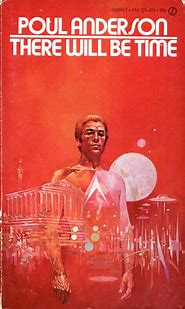Monday, 11 July 2022
Not Changing The Past
Time travellers can do a lot in the past even without changing events. For example, Feliz a Rach fell into a waterfall and it was thought that she had died. Tom Nomura did not prevent her from falling but did pull her out, preventing her death. Time travellers' ability to change the significance of known events without changing the events is even clearer in the immutable timeline of Poul Anderson's There Will Be Time. When Jack Havig is recruited into the time travelling organization, the Eyrie, one of his fellow recruits is an agent infiltrated into the Eyrie by an older and wiser Havig. This goes beyond the familiar circular causality paradox and is an aspect of time travel that could be explored further. In Michael Moorcock's Behold The Man, Christianity would have existed even without extratemporal intervention but would have been entirely mythical. History was a stage where the time traveller was able to play a role as we said in a different context of Keith Denison and Cyrus the Great.
Subscribe to:
Post Comments (Atom)

8 comments:
Christianity is a religion which originated entirely within "historical time", in a literate civilization, and its first scriptures were written down within the lifetime of people who were supposed to have been around when the events described occurred.
Therefore it had to have -some- historical basis. I don't think it could have been entirely mythical, like religions which arise in the "time of legends".
Mind you, that doesn't mean that everything in the documents is accurate. Mormonism and Scientology also arose in historical time.
Kaor, Mr. Stirling!
And I no longer believe the Synoptic gospels were written as late as some still insist, after AD 70 or even 80.
One thing I remembered about Scientology was the story that L. Ron Hubbard invented it to prove he could con the IRS into agreeing he could have tax exempt status!
Ad astra! Sean
Sean: I've talked to L. Sprague de Camp, who was there when Hubbard took the bet, as he and some other SF authors sat around with John W. Campbell.
Kaor, Mr. Stirling!
An amusing story! Too bad some actually fell for Scientology!
Ad astra! Sean
Sean: doesn't seem to have done Tom Cruise any harm. And their "Writers of the Future" series has helped a lot of budding authors make their first sales.
My understanding is that those who think the synoptic gospels were written after 70 AD, do so because they mention the destruction of the temple, which occurred in 70 AD. If there are in fact unambiguous mentions of that historical event, I would consider that a reasonable deduction. I haven't looked into this enough to say where in the Gospels this is mentioned or see how unambiguous this is.
Similarly, description of the death of Moses in Deuteronomy tells us that at least that part of Deuteronomy was written by someone other than Moses.
The Biblical scholar I know, James Crossley, argues for a very early Mark and that Jesus was a Law-observant Jew.
Kaor, Jim!
I discussed such points more fully in "Books, Baths and a Cross God." See my comment for July 6, at 1.12.
I'll only say the Oxford Fragments of Matthew, found with legal documents datable to AD 65-66 in Egypt, gives us physical evidence for a much earlier dating of Matthew, BEFORE the fall of Jerusalem to the Romans in 70. That too helps me in dismissing Q/and a late dating of the synoptics.
Post a Comment